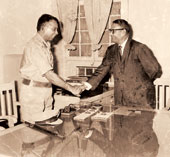 |
| Ranjit Kumar Gupta (left) takes over as commissioner of Calcutta police from P.K. Sen in 1969. The last rites of Gupta, who passed away on Saturday at 93, will be performed at Keoratala on Monday. “He was diagnosed with colon cancer in 1992. Four years later, he got a pacemaker implanted,” said one of his sons, Indrajit. Post-retirement, Gupta penned six books, including an autobiography which is yet to be published |
The passing away of Ranjit Kumar Gupta marks a watershed in the history of police in Bengal as it brings down the curtain on the list of the “Indian Police” officers who served in the state.
My personal memory of him is mostly after his retirement since I had come to the state two years before he retired. I first met him when he was in Darjeeling during the visit of Mrs Indira Gandhi as Prime Minister in 1975.
He was the inspector-general of police, as was the rank of the state police chief in those days. About six IPS trainees from different districts of north Bengal had been sent there, most probably as part of a learning process. I was one of them, from Jalpaiguri.
We were asked to be in the control room in shifts, perhaps to keep us safely tucked away. But as my luck would have it, he walked in and out as many as three times during six hours, unaccompanied by any other senior officer. Unfortunately, during that period, other senior officers were out and I was holding fort. To face the police chief alone was a daunting experience. But he didn’t notice my rank, only asked some rapid questions and wanted to be connected to various officers. Later on, I felt, he would have noticed had I failed to deliver. And I also felt that we had been called there on his instructions.
Again, as only a trainee at Police Training College, Barrackpore, I was part of another innovative idea of his. About six groups were formed, each consisting of a serving deputy superintendent, assisted by one deputy superintendent trainee and an IPS trainee. Each group was given a list of districts we were to visit and inspect at random the armouries of any police unit, including the district armoury.
We had the authority of the IGP himself and no superintendent of police could refuse us. The visits to various places, all of which I was seeing for the first time, are still etched in my memory. And, it was a great learning process.
In two weeks, I had an inside view of policing in the field and learnt more intensively than I would have in six months in class. But the very idea of bypassing the whole administrative structure and having a surprise check done by outside independent teams, consisting of such junior officers, was original and highly effective. I had a healthy respect for the person who could take such a decision.
 |
Otherwise, I saw him from a distance on certain occasions. The most noticeable thing, I felt, was the aura of authority that he exuded. As is known by officers far more senior to me, he consistently raised his own stature while in office and thereby that of the organisation he led, by every possible means.
During my successive years, in course of various postings, I met Mr Ranjit Gupta, the retired person, or had calls from him. He carried himself with the same authority. Many a times he would simply walk in without any previous notice and after settling down, would say: “Prasun, I want you to do this….” He never hesitated calling officers who may not have worked under him, and start by saying: “This is Ranjit Gupta calling...”
He knew he would be recognised and his request complied with.
He used to send me small handwritten letters at times. When I was elected president of the Cricket Association of Bengal, he had sent a letter: “…you are the first policeman in India to be elevated to this honour. I hope more Bengali cricketers will emerge with your help.… I was a humble polo player and was president, Calcutta Polo Club, and a permanent delegate to the IPA....”
In 2006, we had a year-long celebration of the 150th anniversary of Calcutta police and held many events throughout the year. In the inaugural function at Nandan, we had invited all former police commissioners. In spite of his ill health, Mr Gupta was present, besides a number of others.
At the beginning of the programme, the chief minister, Mr Buddhadeb Bhattacharjee, was to felicitate all of them by presenting them with bouquets of flowers and a memento. When his name was announced, Mr Gupta started getting up very slowly. I realised it would be difficult for him to walk up to the stage. I was in a bind when the CM said: “No, no, I am going down.” And he walked down and went to Mr Gupta to hand over the gifts. The whole audience applauded to appreciate this wonderful gesture.
After a few days, I received a letter: “My dear Prasun, let me congratulate you for your spectacular welcome of your force’s 150th anniversary. It went off like a ceremonial drill. How good of you to have suggested the flower ceremony. In the last step of my life I felt so proud. And I have seen so many chief ministers, but none that I can think of coming down the dais to felicitate a former policeman.…”
In the departure of Mr Ranjit Gupta, we have lost a person who had become a legend during his career, who was a born leader of a force, was confident of himself, trusted his juniors and identified himself with them so much that he called himself a Policeman and not a Police Officer.











